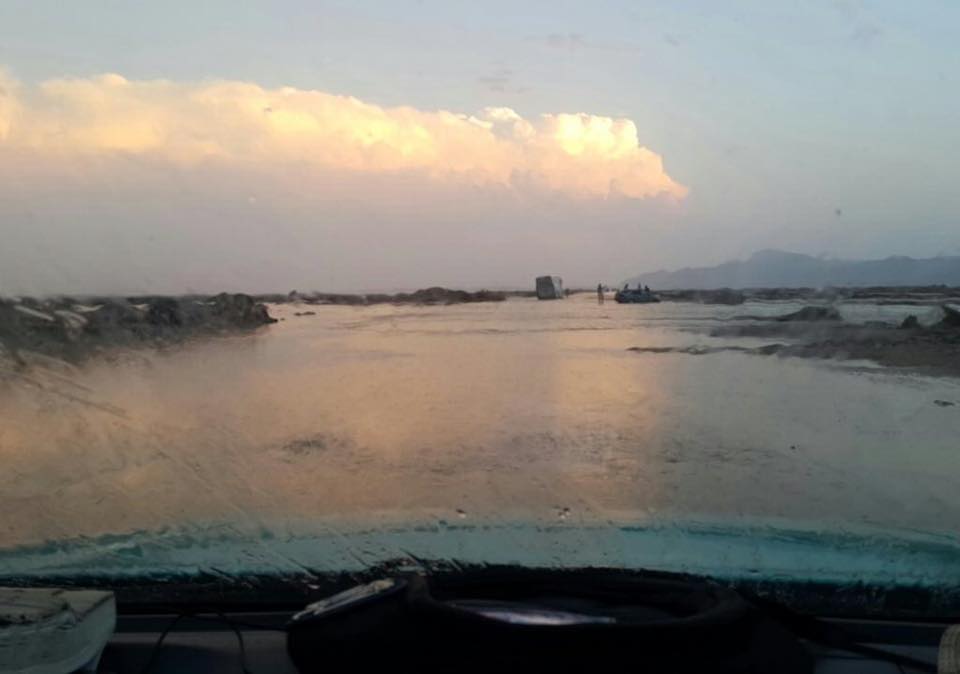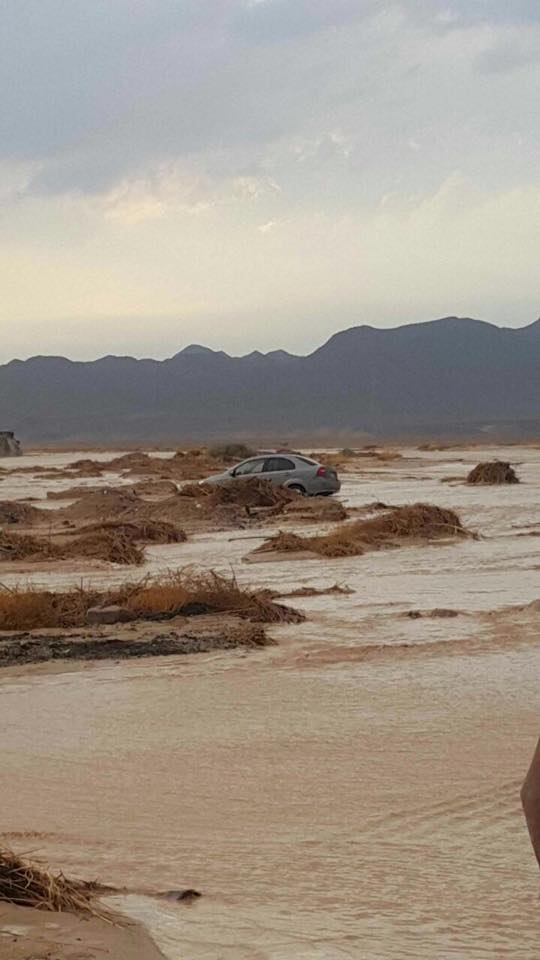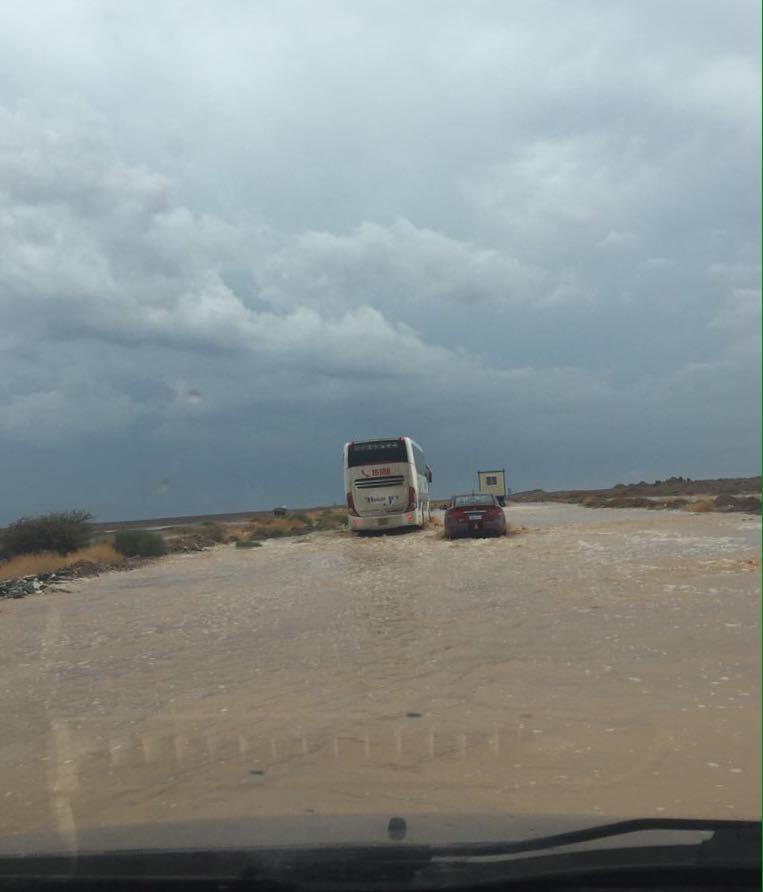There are some stories that show the silver lining in the midst of the daily chaos and negativity we have seemed to have grown accustomed to. This one really struck a chord with me, having pretty much grown up in the city of Hurghada only a mere 150k from where this story took place, I can very much relate to stories like these where the most unlikely individuals are those that really shine through.
Egypt has become the go to for stereotypes with each headline being worse than the next, and yes I am not denying part of it is true, and although things might not be looking so bright right now, at least there are still stories like these.
Thank you Suzee for letting us share your story

“#Thisisegypt I’ve never felt so petrified and so grateful in my life. 26 people died this weekend in flash floods along the Red Sea coast. My friend and I were caught in one of these floods, driving to Gouna, just 50km away from Hurghada.
We were the last car to pass the Ras Gharib check point before the army shut the road, and we decided to keep driving through the storm. The rain was dramatic but not life threatening. We drove through one flash flood area – where rain water comes gushing down violently from the mountain like a torrential flood, covering the asphalt road and pushing mud, soot and everything else down towards the sea – and it was terrifying but we’d made it through.
We were driving behind several cars and once we’d passed the flood, everyone got out to shake hands and talk about it because we were all shaken. Then we came to a part in the road that was completely covered in brown water. It was really calm, so we thought it might be a shallow puddle, but just to be safe, we waited for a lorry to pass first so we could tail it.

Barely five minutes in, we realise that the water is deep, reaching the top of the car tires, and waves of brown water kept slamming against our car. And then we saw the lorry – just a few metres ahead- get pushed off the road by the sheer force of the waves, and fall to one side. That’s when M.stopped the car and we realised that water was gushing through the closed doors and filling up to our knees. We were going to drown in the car if we didn’t get out.
For a good two minutes I couldn’t move out of sheer terror, and M kept shouting ‘Get out of the car. You need to get out of the car!’ We grabbed our bags and climbed out, waves at our thighs by this point, and we looked across the road, to the dry side, where a row of people were standing and filming us. We were stuck, and they were filming us.

Then I found two tanned-skin men run into the water towards us, one of them grabbed my bag and my hand as I slipped into the water and dropped everything, waves pushing my knees till they buckled. I stared behind me as he dragged me through the water, and saw M. fall into the water just as another man grabbed her hand. Survival instinct set in and I kept going towards the land.
Once I was on the land, three children and two women grabbed me and my bags. They started a fire, made me tea and let me change into dry clothes in their dark and leaking shack.
For five hours M and I were the guests of this beautiful and generous family of bedouins, whose women with their gorgeous honey eyes laughed as they talked about their little babies, Hoda and Khadiga, who loved her father Mohamed so much, she’d cry when he’d leave her for more than a few minutes, and 10-year-old Fatma whose lanky body and boy clothing made me mistake her for a boy, and 15-year old shaimaa, who watched me put on mint lip balm and let me put some on her finger to smell. ‘We spend our days and nights together,’ said their grandmother, 40-something year old Om Mona. ‘We have no one but each other, that’s why we’re so close.’
The four men who saved us looked me in the eye when they shook my hand, offered us cigarettes and had no qualms about our gender or cultural differences. We were their guests and they made us tea with sugar as they complained to us about the sugar crisis, the army, the fact that they’ve been living in this area for generations yet no one takes their advice when building the roads or preparing for the floods.
‘Every time, it’s us who pull the people out,’ Mohamed told me, ‘It’s us who dig the cars out. If you asked us we could tell you how to stop the floods from ruining the roads. But no one asks us.’
By this time I counted six cars stuck in the mud, three massive buses and three lorries. The area had no network and we only had one surviving phone between us, but it didn’t matter as no one would be able to come rescue us – the road was completely immersed in water and whole groups of cars were stuck on dry bits like islands. There was no going forward or going back.
At one point, a man came over from the other side of the road where 200 cars or so were waiting. I thought he was coming to check on us – two girls stranded in the middle of nowhere – but instead he asked Mohamed for bread. Mohamed said no. Then he asked for coal. Then he asked for a pot: ‘I have kebda that I want to cook but I need a pot,’ he explained. He didn’t offer any to Mohamed, whose little babies were chewing on dry bread, the only food I saw them eat that whole time.
Eventually, a policeman, Ostaz Ahmed, came over to our side (thigh-deep in water), told us he’d got us a tow truck to take the car and us back to Hurghada then, so we said goodbye to the bedouins and got into his truck.
Once he drove us to the other side, we found out he’d been lying. There was no tow truck. There were no rescue services. Ostaz Ahmed said he’d taken us from the Bedouin because they were ‘traitors’ known for high jacking and kidnapping in the area. When M. Tried to object, I touched her arm. I just wanted to go home.
Ostaz Ahmed kept us in his car, dry and safe, as the rain started to pour down again, and he waded out through the mud and water to try to dig out our car. With just one other man, rope tied to his police truck and the help of our Bedouin friends, Ostaz Ahmed dragged our car out of the mud, and pulled it to safety.
Miraculously the car was still alive, though full of flood water, and he said goodbye to us and left. At this point it was dusk and I realised that Ostaz Ahmed had saved us from a night spent in the darkness and cold by the roadside waiting for help that never came. Of all the cars that passed us, and the people that stared at us, shivering and smoking by the police truck, only one person – a woman – asked if we needed help or a ride.
Once we got into the car, we found two stranded passengers and took them along with us. There we were, four traumatised stranded passengers, sitting in a car knee deep in water with no lights and a barely functioning engine, rattling on through the last 40km in pitch darkness until we reached the Hurghada gates and a border soldier stopped us. ‘Akhbar el sekka eh?’ He asked, and we looked at him with mud in our hair and wet bodies. ‘It’s ok,’ one of us said, ‘You just won’t make it to Cairo, that’s all.’
That day 26 people died, including two babies that were swept out to sea. I am very aware of how dangerous our experience was, but I’m also deeply grateful for the immense and inexplicable kindness of strangers. I think of Ostaz Ahmed, thigh-deep in water, working through the rain to try to salvage the car just so we wouldn’t be left alone on the road at night, and the Bedouin family with their generousity and friendship – this family had nothing but a leaking roof and stale bread, but they gave us exactly what we needed – warmth and comfort. Neither of these groups were obligated to help us, but they did so out of kindness, and I like to think that they are the real Egypt, that #thisisegypt, not your fancy Tv campaigns or hashtags, it’s the compassion we have for each other: when things get rough, there will be kindness.”
WE SAID THIS: Here is to silver linings!


